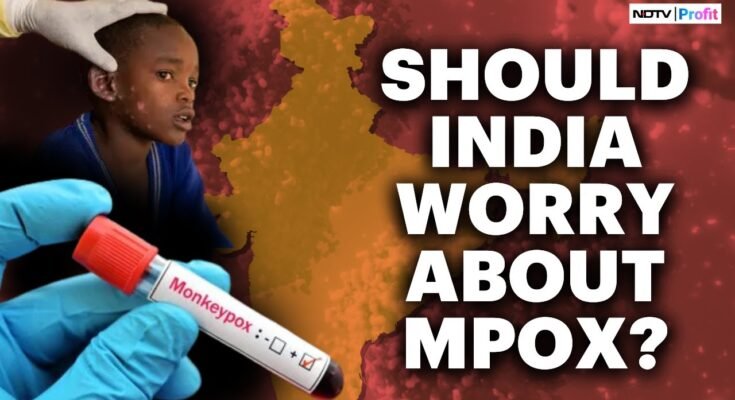Introduction
With the world becoming more connected than ever, global health concerns are no longer confined to their regions of origin. One such emerging issue is the global Mpox outbreak. This article aims to provide valuable insights for health professionals and travel enthusiasts into whether India should be concerned about this alarming situation. We’ll explore the origins of the Mpox virus, its symptoms, transmission methods, and most importantly, evaluate India’s preparedness and potential risk factors.
Understanding Mpox
Mpox, also known as Monkeypox, is a viral zoonotic disease that was first identified in monkeys in 1958. The disease is caused by the Monkeypox virus, which belongs to the Orthopoxvirus genus, the same family as the smallpox virus. Although Mpox is less contagious than smallpox, its potential to cause severe illness makes it a significant health concern.
The virus primarily spreads through direct contact with bodily fluids or lesions of infected animals or humans. It can also be transmitted via respiratory droplets during prolonged face-to-face contact. Understanding the mechanics of Mpox transmission is crucial for implementing effective preventive measures.
 Symptoms to Watch For
Symptoms to Watch For
Mpox symptoms can range from mild to severe and typically appear within one to two weeks after exposure. Early signs include fever, headache, muscle aches, and swollen lymph nodes. These symptoms are often followed by a rash that progresses to pustules and scabs, mainly affecting the face, hands, and feet.
Early detection is key to controlling the spread of the disease. Health professionals should be vigilant in recognizing these symptoms, especially in individuals with a history of travel to affected regions. Prompt diagnosis and isolation can significantly reduce transmission rates.
Global Spread and Current Status
Mpox outbreaks have been reported in various parts of the world, including Central and West Africa, Europe, and North America. The current global spread raises concerns about the virus’s potential to reach new regions, including India. While international travel restrictions have helped contain the virus, the interconnected nature of our world means that no country is entirely safe from potential outbreaks.
Monitoring global health concerns and staying updated on the latest developments in Mpox cases worldwide is essential for health professionals and travelers alike. Being aware of the virus’s status in different regions can help in making informed decisions about travel and healthcare practices.
India’s Historical Context with Zoonotic Diseases
India has faced its share of zoonotic diseases, from Nipah virus outbreaks to the more recent COVID-19 pandemic. These experiences have highlighted the country’s need for robust healthcare infrastructure and rapid response mechanisms. Learning from these past events can help India better prepare for potential Mpox outbreaks.
Zoonotic diseases have a unique way of highlighting the interconnectedness of human and animal health. India’s past experiences with such diseases underscore the importance of a One Health approach, which integrates human, animal, and environmental health to prevent and control zoonotic threats effectively.
Vulnerability Due to Population Density
One of India’s most significant challenges is its high population density. Crowded urban areas can accelerate the spread of infectious diseases, making containment efforts more difficult. Additionally, the strain on healthcare resources in densely populated regions can hinder effective response measures.
Addressing these vulnerabilities requires a multi-faceted approach. Strengthening public health infrastructure, improving access to healthcare services, and promoting public awareness about preventive measures are crucial steps in mitigating the impact of potential Mpox outbreaks.
Travel and Tourism Factors
India is a popular travel destination, attracting millions of tourists annually. While this boosts the economy, it also increases the risk of importing infectious diseases. Travel enthusiasts should be aware of the potential health risks and take necessary precautions when visiting or returning from regions experiencing Mpox outbreaks.
For travelers, staying informed about health advisories and following recommended guidelines can make a significant difference in preventing the spread of Mpox. Simple measures such as practicing good hygiene, avoiding contact with sick individuals, and seeking medical attention promptly if symptoms arise can go a long way in safeguarding both personal and public health.
Preparedness of Health Infrastructure
India’s healthcare system has made significant strides, but challenges remain. Ensuring that hospitals and clinics are equipped to handle Mpox cases is crucial. This includes training healthcare workers to recognize symptoms, implementing effective isolation protocols, and providing access to necessary medical supplies.
Investing in healthcare infrastructure is a continuous process. By focusing on enhancing diagnostic capabilities, improving disease surveillance systems, and fostering collaboration between public and private healthcare sectors, India can strengthen its preparedness for potential Mpox outbreaks and other emerging health threats.
Public Awareness and Education
Public awareness campaigns play a vital role in preventing the spread of infectious diseases. Educating the public about Mpox symptoms, transmission methods, and preventive measures can empower individuals to take proactive steps in protecting themselves and their communities.
Effective communication strategies are key to reaching diverse audiences. Utilizing various media platforms, including social media, television, and community outreach programs, can ensure that accurate information reaches a wide audience. Collaborating with local leaders and organizations can also enhance the impact of public awareness initiatives.
Government Policies and Measures
Government policies and measures are critical in managing public health crises. Implementing travel restrictions, conducting mass screenings, and providing financial support for healthcare facilities are some steps that can be taken to mitigate the risk of Mpox outbreaks.
Policy-making should be informed by scientific evidence and expert recommendations. By fostering collaboration between government agencies, healthcare institutions, and international organizations, India can develop and implement comprehensive strategies to address the threat of Mpox and other zoonotic diseases effectively.
Role of International Collaboration
Global health concerns require a coordinated international response. Collaborating with organizations like the World Health Organization (WHO) and neighboring countries can enhance India’s ability to monitor and respond to Mpox outbreaks. Sharing data, resources, and expertise can lead to more effective containment efforts.
International collaboration is essential for addressing the complex challenges of zoonotic diseases. By participating in global health initiatives, conducting joint research, and leveraging international support, India can strengthen its capacity to prevent and control Mpox outbreaks and contribute to global health security.
Vaccination and Treatment Options
Currently, there is no specific treatment for Mpox, but supportive care can alleviate symptoms and reduce complications. Vaccination, particularly with the smallpox vaccine, has shown some efficacy in preventing Mpox. Exploring vaccination options and making them accessible to those at risk can be a proactive measure.
Ongoing research and development efforts are crucial for advancing our understanding of Mpox and improving treatment options. By investing in vaccine development and distribution, India can enhance its preparedness and response capabilities, ultimately protecting its population from the potential impact of Mpox outbreaks.
Conclusion
In conclusion, while the global Mpox outbreak is a cause for concern, India’s preparedness and proactive measures can significantly mitigate the risk. Health professionals and travel enthusiasts must stay informed, practice preventive measures, and participate in public health initiatives. By fostering a sense of community and collaboration, India can effectively address the threat of Mpox and contribute to global health security.
To stay updated on the latest developments and access valuable resources, consider subscribing to our newsletter and joining our community of health professionals and travel enthusiasts. Together, we can make a difference in safeguarding public health and ensuring a brighter, healthier future for all.
Read also :




